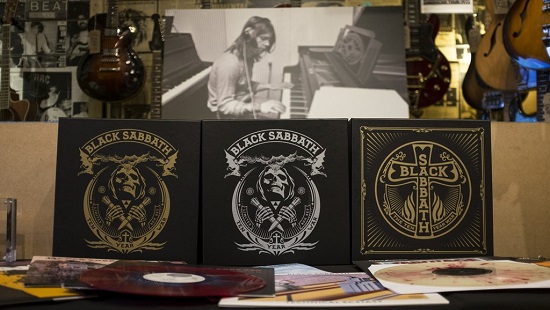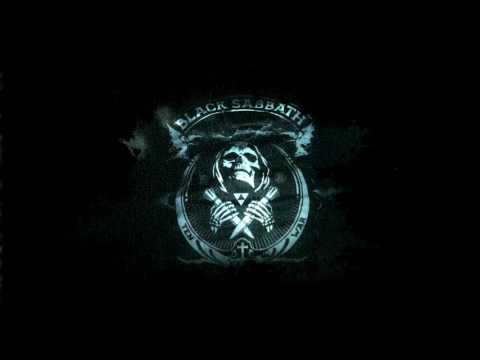The Ten Year War, photo by Regent Sounds
Bill Ward and Tony Iommi of Black Sabbath looked back on their band’s most fruitful years at an event to promote their new boxset release, The Ten Year War.
The release, which compiles the band’s first eight albums, from their 1970 self-titled debut through to 1978’s Never Say Die!, is named for the band’s long-standing wrangles with the press during their early years, with a pamphlet of the same name reproduced for the new box set.
The music has been restored to the highest grade format available, MQA audio, designed to offer the best quality audio possible for streaming services. Claiming to offer a resolution comparible to CD, the albums are included on MQA on a USB drive in the shape of the band’s infamous inverted cross as part of the boxset, and will be streaming as part of Tidal’s ‘Masters’ series of MQA-quality streams.
The launch event was held in Regent Sounds Studios in London, now a guitar shop, in the very room where Sabbath’s first two records were recorded. Iommi was interviewed live on stage, while Bill Ward, who was omitted from the line-up on the band’s farewell tour after a shoulder injury and subsequent fall-out with singer Ozzy Osbourne, sent a video message projected to a small but eager crowd.
“There were times when I felt very angry towards the press because of their comments,” said Ward of the so-called Ten Year War, a period which saw Black Sabbath receive scathing reviews from a large swathe of the media. “I didn’t like them. I was too selfish and soft-centred. They were probably trying to be artistically provocative…”
Iommi remembered: “For some reason the British press just couldn’t stand us, so we got to the point where we thought ‘that’s it, we’re not doing any press.’ It wasn’t worth it, we got better press by not doing any. I’ll always remember one guy came along to report on our show and I read his review, he’d came and then just left again straight away… That’s true, and it’s a shame really. I don’t mind criticism if its deserved, but some of them just didn’t like us.”
Remembering the band’s early recording sessions at Regent Sounds, Ward said: “We were such a tremendous, forceful [live] band, the only way to record Black Sabbath was to throw a lasso around it and literally pull it in. We didn’t have very big lassos back then. I think we did very well.”
Iommi, meanwhile, explaining a number of photographs from the band’s early studio sessions which saw him bearing a black eye, recounted the story that would eventually spark ‘Fairies Wear Boots’. “We got into a fight a couple of days before we were due in the studio with some mods, who of course didn’t like us rockers. We ended up in this ginormous fight, Ozzy hit someone over the head with a hammer. There was only the four of us and one of the crew, you had to have a weapon of some sort! A hammer did the job, although Ozzy’s got a gun now…”
The two were both asked to pick their favourite tracks from the Sabbath canon, with Ward singling out 1971’s Master Of Reality as his favourite record. “The great thing about being a great band is it takes risks,” he said, singling out album track ‘Children Of The Grave’ for particular praise. “We had the foundation down, the rhythms and grooves, but then it was time to take a risk. Someone, it might have been Geezer, decided to put down that huge sounding church organ. It changed the shape of music, it showed people what Black Sabbath were capable of playing.”
Iommi, meanwhile, remembered the sudden and unexpected vault to fame that greeted the band once ‘Paranoid’ became a hit record. “That song threw us in a different direction, we didn’t want to do Top of the Pops. We were attracting screaming girls, but that wasn’t us, that wasn’t the band. We wanted to be accepted musically, not as flavor of the month. Paranoid threw us off the rails a bit.” The record’s dark lyrics, he argued, became lost in the madness of sudden fame. “I think at the time bands were in and out so quickly that I don’t think anyone bothered to work out what it was about, they just liked the rhythm of it.”
Iommi also hinted that the band’s ‘The End’ tour might not, in fact, be the very last we hear of Black Sabbath. When asked whether this was really it for the metal legends, he couldn’t be drawn on specifics but did reveal “I love playing, I’d like to work with the guys [again] at some point!” The frontman explained: “It’s good to have some time to really look at things and what I really wanna do, because for nigh on 50 years I’ve never had time to come down from things, you’re always getting ready for the next tour, the next album or the next interview.”
It is definitely, however, the end of Sabbath as a touring act. “I don’t want to tour the world again,” Iommi said. “I get pretty tired of doing it now. Being on stage is the ultimate thing but people don’t understand the rest of it. They’ll just see you there for a couple of hours and they don’t know it’s taken eight hours to get there, plus interviews and press, and after you’ve got to wind down and get back to the hotel, sometimes not ‘til 4 in the morning. In the days where we used to stay up all night it was brilliant, but not now!”
Ward, meanwhile, said that he missed playing with the band while discussing his love of Paranoid album track ‘Hand Of Doom’. “I wish I was still playing it, I miss it, it’s part of who I am, part of Sabbath.”
Iommi addressed Ward’s absence on the final Black Sabbath tour, which saw the founding member replaced by session drummer Tommy Clufetos. “It would have been nice to do these last shows with Bill, but it just didn’t happen. It’s silly really because it was over nothing. Even if he’d have played a couple of shows it would’ve been great. It’s too risky to go out and have Bill say ‘I can’t do it’ and cancelling on 70,000 people.”
The Ten Year War is released on September 29 via BMG, for all the details, click here. For more on MQA, click here.



